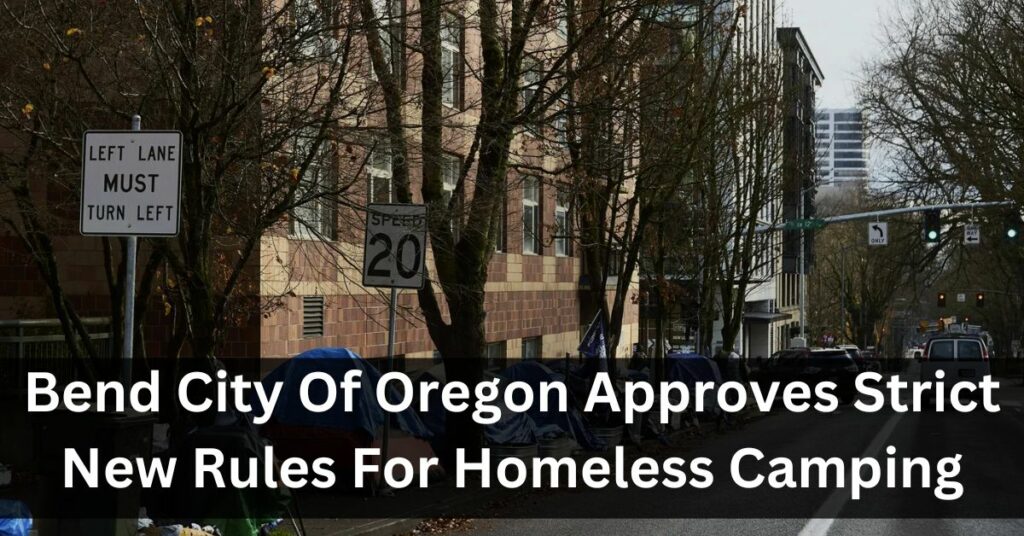Bend City Of Oregon Approves Strict New Rules For Homeless Camping: To control encampments amid an escalating homelessness crisis brought on by a lack of affordable housing and the coronavirus pandemic, Bend, a city in central Oregon, has approved strict new camping regulations that will limit where, when, and how people can live outside.
According to OPB, the code modification, which was approved on Wednesday, will mandate that anyone camping on city property or public rights-of-way, including sidewalks and landscaping strips, move their location by 600 feet, or one block, every 24 hours.
There will be no camping allowed in any places designated as residential. The new rule also limits how big camps can be, no bigger than 12 feet by 12 feet, and how far apart they must be, no closer than 150 feet, to prevent major encampments from growing. Only three camps are permitted per block.
The regulation also specifies what items homeless persons are permitted to own when sheltering outside. Only things that the city deems necessary will be accepted. Storage of items like generators and furniture won’t be allowed unless it’s necessary for “camping, sleeping, or keeping warm and dry.”
The contentious code change sparked strong feelings during the meeting on Wednesday, mirroring other contentious debates in Oregon, including Portland, where cities are struggling to deal with homelessness on their streets.
Like in other Oregon cities, officials in Bend have found themselves at the centre of a contentious public debate regarding encampment sweeps. The majority of speakers at the meeting on Wednesday urged councillors not to approve the code change, despite mounting pressure from some residents for Bend to remove camps, according to OPB.
The change “causes a lot of harm,” according to Councilor Mo Mitchell, who voted against the code. She expressed worry that it was passed too quickly and would only further criminalize homelessness in the city. Mitchell expressed his worry that there would be significant police involvement as a result.
“Police are not trained to understand some of these complexities,” the author claims. Representative Melanie Kebler The code’s goal, according to Kebler, the city’s upcoming mayor, is to establish some guidelines for the types of camping that are permitted.
The code change for Bend, approved Wednesday, will require people camping on city property and public avenues such as sidewalks and landscaping strips to move locations by 600 feet every 24 hours. Camping in residential areas will be banned completely. https://t.co/oL4gCPFzOU
— KEZI 9 NEWS (@KEZI9) November 18, 2022
Kebler added, “Our community has been begging for some clarification. “I believe we are making progress toward it.” Before this, there was no law governing camping on city property in Bend. Only after receiving a 72-hour eviction notice and being deemed a public safety hazard may the city remove a campground, which City Manager Eric King has done repeatedly over the previous two years, according to OPB.
There is no specific information in the code regarding how the city will carry out its enforcement. According to city officials, negotiations about creating administrative regulations will start in December and last through March.
According to OPB, the 2022 point-in-time count found at least 1,300 homeless adults and children in Central Oregon, and it was highlighted that Bend in particular has hundreds fewer shelter beds than required.
In another part of Oregon, the Portland City Council recently approved a resolution that outlaws camping on public property and designates specific locations where the homeless are permitted to do so. The law is expected to become fully effective in 2024.
City Council members in the central Oregon city of Bend have approved strict new rules for homeless camping. https://t.co/oCdO2wVXam
— Statesman Journal (@Salem_Statesman) November 19, 2022
Final Lines
Share your thought about this in the comment section below. Read other trending articles like Oregon’s Unemployment Rate Increased To 4.1% In October! only on the website domaintrip.com.

